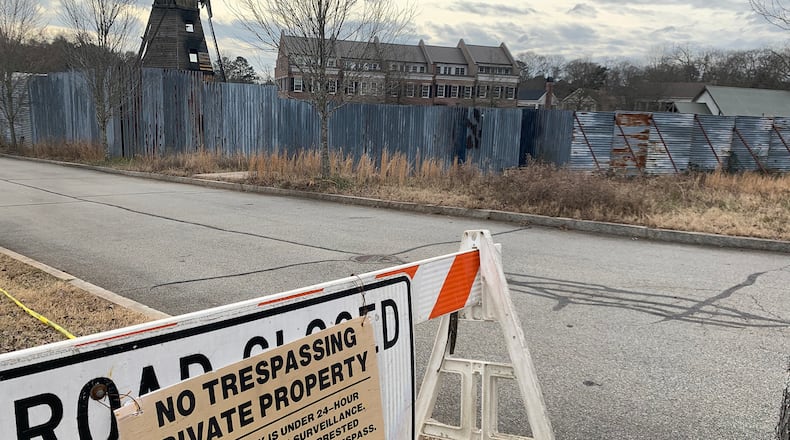For nearly eight years, “The Walking Dead” has used a real neighborhood development in Senoia to shoot its fictional home base Alexandria where many of the show’s key characters have resided.
Alexandria’s most distinctive feature is the corrugated metal fencing wrapped around the space used to keep zombie “walkers” away. Visitors to Senoia can see some of the interior from the outside including the church, the windmill and many of the homes.
But as the long-running AMC drama wraps up filming its 11th and final season next month, AMC is planning to take down the fencing and dismantle key set pieces like the church and the windmill.
According to the Newnan Times-Herald, “The Walking Dead” location manager Michael Riley of Stalwart Films asked the local city council at a meeting to keep Morgan Street leading into the neighborhood closed to traffic until June to give the production enough time to clear out.
Currently, seven families live in the neighborhood, dubbed the Gin Property, five of whom have been there since 2014.
Scott Tigchelaar, president of Senoia Enterprises, is one of those residents. He is also a real estate developer who owns the Gin Property with his CFO Brian Jagt.
Before “The Walking Dead” showed up, Tigchelaar had already built 10 homes in that area right off Main Street. AMC decided to construct 10 more homes for use on the show. Aware the show might need the space for several years, the buildings were erected not as sets or facades but actual houses with plumbing, HVAC and all the amenities.
In the end, “The Walking Dead” has used the neighborhood for almost eight years spanning seven of its 11 seasons. The final season of 24 episodes has been split into three. The first eight have already aired. The show returns to AMC on Feb. 20 with the ninth episode of season 11.
With AMC almost ready to leave the site, the 10 homes will soon be prepped for sale. Given the demand for housing in the area, Tigchelaar expects the homes to sell quickly and likely at a premium given their origins.
Tigchelaar in 2014 signed a joint venture with AMC regarding the houses and will get a cut of the sales.
His ties with “The Walking Dead” run deep. He used to be a minority owner of Riverwood Studios, where “The Walking Dead” was based, until AMC purchased the studio in 2017. In 2016, he became part owner of Nic & Norman’s, a popular restaurant on Main Street, with “The Walking Dead” actor Norman Reedus and executive producer Greg Nicotero. And he also owns significant parcels of land on Main Street. The street is 100% occupied and he said there is far more demand than supply for retail and office space in the area.
Not surprisingly, Tigchelaar said he found the benefits of living in the middle of a TV set part of the year was well worth the inconveniences of having to go through a checkpoint and avoiding certain parts of the neighborhood during specific times. They’d also have to turn out their lights when requested. (The homeowners have been compensated for the hassles.)
“It’s been surreal,” Tigchelaar said. “Actors have come and gone. Andrew Lincoln [the former lead actor who played Rick Grimes] was a real gentleman. One time, he came up and thanked me for letting them film in Alexandria. I said, ‘Thank you for doing this in our neighborhood!’”
Credit: AMC
Credit: AMC
This is a small town. When Riley made the request to extend the street closure in town, only two council members and the mayor were in attendance, the Newnan paper noted. Mayor Dub Pearman had to recuse himself from the vote because his house backs up to the wall. Councilwoman Tracy Brady lives on the Gin Property and also had to recuse herself.
So that left one councilman, Matthew Faust, to approve the extension.
Pearman, mayor for two years and a resident since 2012, said part of the wall is on his property and AMC pays him a small rental fee. The show even rented his home for use on the show in season four.
“Strangely enough, we’ve gotten used to the wall,” Pearman said. “Usually if you see police lights and road closures, you wonder if there’s been a big accident. For us, it just means they’re filming.”
Once “The Walking Dead” is out of the area, more townhomes, brownstones, condos and single family homes will be built on the Gin Property.
Tigchelaar said there are no plans to keep any of the wall up for posterity but that doesn’t preclude portions of the wall being dismantled and placed somewhere else, given its relative historical significance.
Credit: Josh Stringer/AMC
Credit: Josh Stringer/AMC
About the Author
Keep Reading
The Latest
Featured





